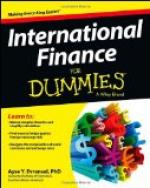All this elaborate, but easily working machinery has grown up for the service of commerce. It is true that bills of exchange are often drawn by moneylenders abroad on moneylenders in England merely in order to raise credit, that is to say, to borrow money by means of the London discount market. Sometimes these credits are used for merely speculative purposes, but in the great majority of cases they are wanted for the furtherance of production in the borrowing country. The justification of the English accepting houses, and bill brokers, and banks (in so far as they engage in this business), is the fact that they are assisting trade, and could not live without trade, and that trade if deprived of their services would be gravely inconvenienced and could only resume its present activity by making a new machinery more or less on the same lines. The bill whose imaginary history has been traced, came into being because the drawer had a claim on England through a trade transaction. He was able to sell it to the South American bank only because the bank knew that many other people in Argentina would have to make payments to England and would come to it and ask it for drafts on London, which, by remitting this bill to be sold in London, it would be able to supply. International finance is so often regarded as a machinery by which paper wealth is manufactured out of nothing, that it is very important to remember that all this paper wealth only acquires value by being ultimately based on something that is grown or made and wanted to keep people alive or comfortable, or at least happy in the belief that they have got something that they thought they wanted, or which habit or convention obliged them to possess.
FOOTNOTES:
[Footnote 2: All this imaginary picture is of events before the war. At present Dr. Pillman, being a patriotic citizen, is saving much faster than before, and putting every pound that he can save into the hands of the British Government by subscribing to War Loans and buying Exchequer bonds. He is too old to go and do medical work at the front, so he does the next best thing by cutting down his expenses and finding money for the war.]




